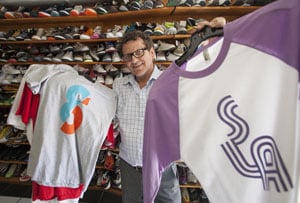
For a quarter-century, L.A. shoe salesman Isack Fadlon watched as athletic footwear brands he sold in his stores – Nike, Puma, Reebok and Adidas, to name a few – expanded beyond shoes to become full-fledged lifestyle brands that includes apparel and accessories.
Now he’s bent on creating a similar head-to-toe lifestyle brand of his own, only he’s doing things in reverse. Rather than first designing a great pair of kicks, Fadlon is jumping feet first into apparel, with plans to introduce his star subject – sneakers – later.
Co-founder of boutique sneaker chain Sportie L.A. Inc., Fadlon recently started selling T-shirts and tank tops in his stores and plans to add a line of sweatshirts, hoodies, jerseys, socks and hats this fall.
The clothing line, dubbed SLA, will eventually include accessories, too, including watches and sunglasses. His ultimate goal, though, is to incorporate those items in a line of fashion-forward sneakers he plans to design himself.
The move from selling other shoe brands to making and selling his own is not a big leap, Fadlon figures. His trend-setting Melrose Avenue flagship store, popular with celebrities and athletes, has long been instrumental in launching fledgling shoe brands and helping older brands introduce limited-edition items. Fadlon is routinely named to Footwear News’ list of 100 most powerful people in the shoe industry.
It might seem counterintuitive that someone with a solid foothold in the shoe industry would start selling a line of apparel before jumping back to the footwear business by making shoes, but Fadlon said he’s chosen that path because it’s an easier, cheaper path. Plus, he doesn’t want to design just any shoe. He wants to be a trend leader.
“It’s something that I know takes time and has to be done right,” he said. “We felt that prior to (shoes) we could self-fund an apparel line and start slow.”
Sportie buys blank T-shirts and tank tops from downtown L.A.’s American Apparel Inc. and emblazons them with its own graphic designs. Eventually, though not this year, Fadlon said he’ll look into his own cut-and-sew operation.
Paul Zaffaroni, a director at Newport Beach investment bank Roth Capital Partners LLC who also sits on the board of the California Fashion Association, said he understands why Fadlon might be hesitant to jump too quickly into making shoes: His reputation is at stake.
“Because of the strong brand he’s built, he’s set a high bar for himself,” he said. “If he’s going to put his name on something within footwear, he wants to do something special and cool and different, and that’s not easy to do.”
Fadlon co-founded Sportie L.A. in 1985 with his sister, Orna Amzaleg. The boutique quickly established itself as an expert curator of trendy sneakers, selling hard-to-find styles such as Adidas’ Made in France Superstars and Reebok’s ’80s-era Freestyles.
Today, the family-owned chain has five stores, including an outlet store called Sportie Last Chance near the Miracle Mile. The chain’s flagship store, at 7753 Melrose Ave., stocks products for more than 5,000 units, about 10 times what a traditional size retailer might carry. The stores have always sold apparel, though today it makes up only about 10 percent of inventory. Fadlon said he wants to double that number when he brings in his own apparel line.
Product mix
Straddling the line between being a retailer and being a manufacturer comes with its own set of challenges.
Zaffaroni said Fadlon needs to be particularly careful that he doesn’t upset the product mix in his stores by bringing in too much of his proprietary product.
“It’s a benefit for retailers to sell their own brand because they can capture more margin, but at the same time, if everything looks the same and you try to do too much, you could lose what draws people in the first place, which is variety and diversity of brands,” he said.
Still, there are advantages to understanding the retail environment before stepping into manufacturing. For one, Fadlon has a sense of what kinds of things his customers will buy. But perhaps more important is the fact that, as a retail buyer, he gets a sneak peek at what the manufacturers will be selling in coming seasons.
“We feel like we have an advantage because we see what’s trending in the sneaker world six to nine months before they hit stores,” he said.
As a result, Sportie L.A. can design apparel with colors and styles that complement the upcoming trends.
Fadlon said he hopes that as the SLA apparel line develops and matures, he’ll be able to bring in celebrities, athletes and L.A. street artists to collaborate with him in designing T-shirts and hoodies. He thinks connecting with high-profile trend-setters early on will serve him well when he starts to do shoes a few years down the line.
“Collaborations are so special and important right now,” he said.
But with a quarter-century of retailing under his belt and a Rolodex full of industry insiders, Fadlon is confident he can call himself a shoe designer in the next few years.
“There’s some trepidation, but I’m comforted by the fact that I know I’m going to have a lot of support,” he said. “We’ve got people on the sidelines rooting for us, and that’s important.”
